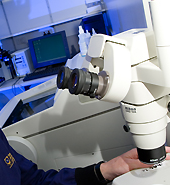Cervical cancer prevented by routine check up

Boone, NC
It is as painless as brushing your teeth, but most women fear it more than midterms, a first date and stepping on the scale after the holidays combined.
By either age 21 or three years after the onset of sexual activity, every female should have her first visit to the gynecologist.
Appointments are available through Student Health Services for pap smears and sexually transmitted infection
screenings.
Students can schedule appointments for as early as the following day.
Appointment times are either during health service operation hours or from 4:30–7:30 p.m. after hours.
A pap smear is $30 and STI tests are free.
Sarah E. Summers, family nurse practitioner at Student Health Services, recommends women to schedule appointments.
“Screening for cervical cancer is a reason why women should go,” Summers said. “[Screening] doesn’t take much time, it’s cost effective, there’s only mild discomfort and it’s the only way to screen for cervical cancer.”
Summers said after the initial exam, a pap smear should be conducted once every year until the age of 30.
At that point, going once every two to three years is probable.
“The risk for human papillomavirus (HPV,) which causes cervical cancer, drops after the age of 30,” Summers said.
Health services offers Gardasil, a vaccination for the virus, for $125 per injection. Three injections are required for a complete vaccination.
“Women in third world countries who don’t have annual pap smears die from cervical cancer,” she said. “The United States should never have a death from cervical cancer.”
In 2004, more than 11,850 women were diagnosed with cervical cancer, and over 3,800 women died as a result.
That same year, over $2 billion was spent treating the disease, according to the Center for Disease Control and Prevention. More >>
Labels: Cervical Cancer Awareness, Cervical Cancer Screening, Pap Smear Test

0 Comments:
Post a Comment
<< Home